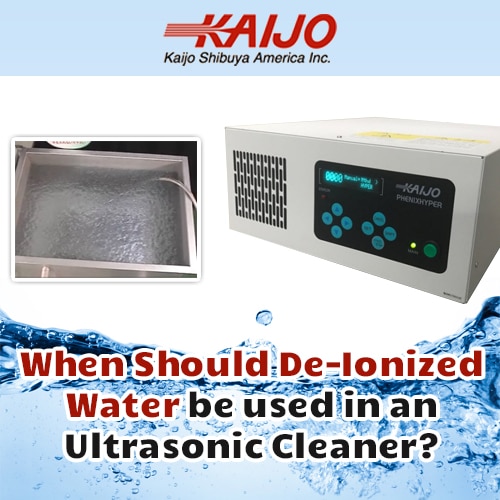When Should De-Ionized Water Be Used in an Ultrasonic Cleaner?
November 17, 2022
 While ultrasonic cleaning systems can work with plain water, de-ionized water can improve cleaning performance in some situations. In some cases, the use of de-ionized water replaces the use of mild detergents or solvents to speed up cleaning. Whether de-ionized water will deliver substantial cleaning improvement also depends on the contamination. Hard-surfaced parts with light contamination can be cleaned adequately with plain water. Using de-ionized water can make the cleaning process more efficient for delicate components or parts with heavy surface contamination.
While ultrasonic cleaning systems can work with plain water, de-ionized water can improve cleaning performance in some situations. In some cases, the use of de-ionized water replaces the use of mild detergents or solvents to speed up cleaning. Whether de-ionized water will deliver substantial cleaning improvement also depends on the contamination. Hard-surfaced parts with light contamination can be cleaned adequately with plain water. Using de-ionized water can make the cleaning process more efficient for delicate components or parts with heavy surface contamination.
De-Ionized Water Speeds Up Difficult Cleaning Applications
Parts with soft surfaces, delicate parts, parts with coatings, and parts made up of several materials are often difficult to clean. Higher ultrasonic frequencies have to be used to avoid damaging the part or component. Sometimes the same part or component has to be cleaned with more than one frequency. As a result, cleaning can take longer. Cleaning times may have to be shortened to reduce waiting times and maintain throughput.
One way ultrasonic cleaning times can be reduced is to add a mild detergent or solvent to the cleaning solution. The detergent helps break the bonds that tie contaminants to the surfaces of the parts to be cleaned. Depending on the contaminant to be removed, it can be targeted with specific detergents or solvents. Removal of surface contamination by the action of the ultrasonic cleaning systems is easier and faster, reducing the amount of time needed to clean the parts.
Using de-ionized water increases the effectiveness of detergents and solvents. Regular water contains several different types of impurities. Detergents and solvents have to neutralize the impurities in the water before they can work on the contaminants of the part to be cleaned. They lose some of their cleaning power that way. De-ionized water is ordinary water that has been purified. It no longer contains impurities, so the total effectiveness of the detergents and solvents is applied to cleaning the parts. Detergents and solvents can speed up cleaning, and de-ionized water helps them reduce cleaning times.
When Detergents Can’t Be Used, De-Ionized Water Improves Cleaning Performance
Some parts to be cleaned, such as printed circuit boards and some medical devices, can be damaged by immersion in detergents or solvents. For these applications, using pure de-ionized water in the cleaning bath shortens the cleaning time and improves cleaning. Regular water contains ions, but de-ionized water goes through a purification process that removes impurities, including ions. When the ultrasonic cleaning systems dislodge particles from the part surfaces, any ions are immediately absorbed by the de-ionized water. Because regular water already contains some ions, it does not absorb ions and clean parts contaminated with ions to the same extent.
De-Ionized Water Rinses Without Leaving Residues
After parts are cleaned with ordinary water or with a cleaning solution containing detergents, the parts to be cleaned have to be rinsed. Rinsing with ordinary water removes any remaining traces of contamination or detergents, but the impurities in the water will leave residues and films when dry. De-ionized water doesn’t contain impurities and won’t leave any surface residues. Rinsing with de-ionized water will completely clean parts, with no remaining surface contaminants or impurities.
Kaijo Offers Free Consulting on De-Ionized Water Questions
With over 65 years of experience in ultrasonic cleaning technology, Kaijo has the expertise to recommend the right solutions for various cleaning applications. Kaijo can advise customers on when de-ionized water will improve the cleaning performance for their specific application. From having first-hand experience and expertise, Kaijo’s experts know how de-ionized water will work in various real world cleaning applications. Kaijo provides guidance to ensure customers get the necessary cleaning performance that meets their requirements.





